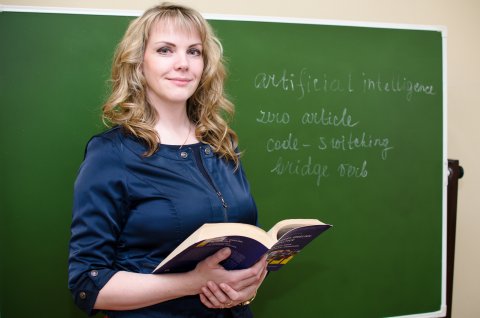Researchers at South Ural State University complete research in various areas. Of no little importance is the work of linguists, who study language. One of the winners of the Support Young Science contest held at SUSU as part of the 5-100 Project, was the project entitled “Cognitive analysis of linguistic units of the international discursive society of philologists”, Evegeniya Khabirova, candidate of philology, associate professor of the Department of Foreign Languages of the Institute of Linguistics and International Communication.
In the modern era of globalization, international partnership is expanding actively. Bringing in international partners is becoming the link between specialists of various fields of science. This activity affects the occurrence of new terms in professional communication which are not yet found in dictionaries and, there for, are very difficult to translate.
“This work is dedicated to the cognitive analysis of linguistic units of the international discursive society of philologists. At the center of attention is the language of professional communication among philologists. The sources for information for this project were articles from highly-ranked scientific journals,” says Evgeniya Khabirova.
The goal of the project was to research the unique cognitive features of the terminology which is used in philology. The cognitive area is one of the most popular in modern linguistics. It studies language as a means of understanding the world. The cognitive approach allows us to study the ties between language and thought, and also discover how the results of understanding surrounding activity affect linguistic units.
“This topic was not chosen accidentally, since the language of professional communication is of special interest to researchers. My research is a continuation of existing scientific developments and allows us to more deeply study the unique features of a philologist’s language and thought. In the terminology of this area we see some metaphorical units like umbrella term or shadow pronoun. You man note that the terms include commonly used phrases with a figurative meaning, which effects the meaning of the whole term. This is an indicator of how, when creating new linguistic units, various kinds of knowledge are mixed – knowledge of the laymen (umbrella, shade) and knowledge of a specialist (term, pronoun). So, a member of the philological discursive society is a multifaced personality – not just a specialist in his professional field with theoretical knowledge but also a typical person with sentient experiences of the surrounding environment,” comments the head of the project.
Evgeniya Igorevna has access to the materials through the SUSU scientific library. The library offers the chance to work with data bases not just from within the university walls, but also from your home PC. Staff have the chance to use the Science Direct, Scopus, and Web of Science research databases. It is possible to find journal articles openly, but some journals are included in the university’s subscriptions. Evgeniya Khabirova analyzes these articles and is researching the terms of philological discourse.
“The result that we receive can be used in a course for masters’ students offered by the Institute of Linguistics and International Communication in English. The Philology: Theory and Practice of English Language program involves the study of current trends in the areas of philology, and therefore requires constant updates,” says Evgeniya Khabirova.
In addition, these results will be helpful for researchers of philology as well who are writing their articles in English for international journals. The existing dictionaries of linguistic terms must be updated constantly, since new terms appear which have not yet been reflected in them. So, it is necessary to keep track of all current changes, take them into account, and update the base.
“First and foremost, I work with dictionaries of linguistic terms. I have a selection of dictionaries by Russian and foreign authors which reflect terms of linguistics and philology. Above all, I am not interested in all terms of philological discourse, but in those which are expressed metaphorically, since they always have a special way of reflecting reality,” explains Evgeniya Igorevna.
Further, the young researcher sees how these terms function in scientific discourse, especially in scientific publications. By using the search by key words function, articles are chosen in which these terms are found, and then they compare how the content shown in the dictionary compares to the meaning shown by these terms in scientific articles.
In her lessons with masters’ students, Evgeniya Khabirova is already using the results of this research by completing analysis of scientific journals. In the future, she is planning on bringing in students into the practical portion of the research, which could become the beginning of their independent scientific project. The future also holds the creation of a glossary of philological terms.




